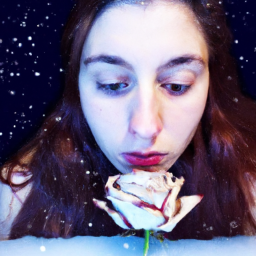While reading F. Scott Fitzgerald’s ‘Winter Dreams,’ I found myself reflecting on the deeper themes of the story. As a lover of literature, I enjoy uncovering the hidden messages that authors weave into their works.
‘Winter Dreams’is a short story that explores the life of Dexter Green, a young man born into a humble family, who aspires to climb the social ladder and live the American Dream. However, his journey towards success is anything but smooth, and the story delves into the various themes that shape Dexter’s life.
The story presents a vivid description of the American Dream, social class, love, illusion versus reality, disillusionment, and how people confront reality. These themes provide insight into the complexities of human life and how people navigate through the challenges to achieve their dreams.
In this article, I will explore these themes in detail, examining how they shape the characters in the story and their relevance to modern-day society.
Key Takeaways
- The pursuit of the American Dream is a central theme in ‘Winter Dreams,’ and it is portrayed as a challenging and ultimately unfulfilling journey.
- The story explores the themes of social class, love, illusion versus reality, disillusionment, and the pursuit of happiness.
- The pursuit of material possessions and social status can lead to a low level of happiness, while love and human connection have the potential to bring high levels of happiness.
- The story serves as a reminder to focus on what truly matters in life and to be careful not to sacrifice our personal lives for the sake of our careers.
Overview of Winter Dreams
You’re going to love the overview of Winter Dreams, it’s a story that will transport you to a wintery world of love, ambition and heartbreak.
The story, written by F. Scott Fitzgerald, is set in the early 1900s and follows the life of Dexter Green, a young man from humble beginnings who falls in love with a wealthy socialite named Judy Jones.
As Dexter’s ambition and success grow, so does his obsession with Judy, leading to heartbreak and a realization about the true nature of the American Dream.
The American Dream is a recurring theme throughout the story, as Dexter strives to achieve success and wealth in order to win over Judy and gain acceptance in high society.
However, as he achieves his goals and comes closer to his idea of the American Dream, he realizes that it is ultimately unfulfilling and leaves him feeling empty.
This realization is a poignant commentary on the dangers of pursuing material success at the cost of personal relationships and self-fulfillment.
The American Dream
Don’t let anyone tell you that achieving the American Dream is impossible, because it is within your reach. F. Scott Fitzgerald’s "Winter Dreams"explores the pursuit of the American Dream through the eyes of its protagonist, Dexter Green. The American Dream is the belief that through hard work and determination, anyone can achieve success and upward social mobility. In "Winter Dreams,"Dexter chases this dream by striving for financial success and the love of a woman from a higher social class.
To understand the significance of the American Dream in "Winter Dreams,"let’s take a closer look at its components. In the table below, we can see the different elements that make up the American Dream and how Dexter pursues each one.
| American Dream Component | Dexter’s Pursuit |
|---|---|
| Financial Success | Golf caddy to Businessman |
| Love | Judy Jones |
| Upward Social Mobility | Climbing the social ladder |
Dexter’s pursuit of the American Dream is not without its challenges. He faces obstacles such as unrequited love and the realization that success does not necessarily bring happiness. However, his relentless pursuit of the American Dream ultimately leads him to a place of self-discovery. As we delve deeper into the story, we will see how the pursuit of the American Dream intersects with issues of social class.
Social Class
So, let’s talk about social class. It’s a fascinating subject to me, especially when it comes to the divide between the upper and lower classes.
The impact it has on relationships is significant too. It’s worth exploring how class can shape our interactions and experiences.
The divide between the upper and lower classes
Although the divide between the upper and lower classes is a prominent theme in ‘Winter Dreams,’ some may argue that Fitzgerald’s portrayal of the wealthy as shallow and unhappy is unfair. However, I believe that Fitzgerald’s portrayal is not only accurate, but also necessary for the story’s message to come across.
The story’s main character, Dexter, is a middle-class man who aspires to be wealthy and successful. Through his pursuit of the American Dream, he becomes entangled in relationships with women from the upper class. These relationships reveal the stark contrast between the lifestyles of the wealthy and the middle class, as well as the shallow nature of the wealthy.
In ‘Winter Dreams,’ Fitzgerald portrays the wealthy as individuals who are constantly chasing after pleasure and status, but never truly satisfied. This is evident in the character of Judy Jones, a beautiful and wealthy woman who is the object of Dexter’s affection. Despite having everything she could possibly want, Judy is unhappy and unfulfilled. She constantly seeks out new experiences and relationships, but is never truly satisfied. This portrayal of the wealthy as unhappy and unfulfilled serves to highlight the emptiness of the pursuit of wealth and status.
Furthermore, this divide between the upper and lower classes impacts not only the individuals themselves, but also their relationships. As we see in the story, Dexter’s relationships with women from the upper class are often fraught with tension and misunderstanding. This is due in part to the differing lifestyles and values of the two social classes. The wealthy are often more concerned with appearances and status, while the middle class values hard work and stability. This divide can make it difficult for relationships to thrive and can ultimately lead to heartbreak and disappointment.
Transitioning into the next section, it is clear that the impact of social class on relationships is a key aspect of ‘Winter Dreams.’
The impact on relationships
The stark contrast between social classes in ‘Winter Dreams’ inevitably leads to heartbreak and disappointment in relationships. I’ve seen this firsthand in the character of Judy Jones and her relationship with Dexter Green. Although Dexter’s deeply in love with her, their different social standings ultimately lead to their downfall.
Judy’s unable to fully commit to their relationship because she’s accustomed to a life of luxury and privileges, while Dexter comes from a more humble background. This divide causes tension between them and leads to Judy’s disinterest in their relationship.
However, despite the hardships caused by the class divide, love still manages to find a way in ‘Winter Dreams.’ Even though Dexter’s unable to be with Judy, he finds love in the form of a new relationship with Irene Scheerer. Unlike Judy, Irene’s from a similar social background to Dexter, and they share similar values and aspirations.
Their relationship’s able to thrive because they’re on equal footing, and they’re able to support each other in their endeavors. This shows that love can still prevail even in the face of social differences, as long as both parties are willing to work towards a common goal.
Love
You can’t help but feel drawn to the idea that love makes the world go round, as the character of Dexter Green in ‘Winter Dreams’ discovers firsthand.
In his pursuit of Judy Jones, Dexter experiences the highs and lows of love. He’s initially drawn to her beauty and charm, but as their relationship progresses, he realizes that she isn’t the perfect, unattainable ideal he had built her up to be in his mind.
Despite this realization, Dexter remains infatuated with Judy, unable to let go of his love for her. If you’re a romantic at heart, you’ll appreciate the themes of love in ‘Winter Dreams’. The novel explores the complexities of falling in love and the pain that can come with it.
However, it also highlights the beauty and joy that love can bring into our lives. Through Dexter’s experiences, we see that love can be both exhilarating and heartbreaking, but ultimately, it’s a powerful force that can shape our lives in profound ways.
As much as we may want to believe in the power of love, ‘Winter Dreams’ also delves into the harsh reality of illusion versus reality.
Illusion versus Reality
Get ready to explore the harsh truth about the difference between what we perceive versus what’s actually real in ‘Winter Dreams’.
Throughout the story, we see Dexter’s illusion of love for Judy Jones and his dream of being with her. However, as the story progresses, we come to realize that his perception of love was nothing more than a mere illusion. Judy wasn’t the person he thought she was, and his dreams of a future with her were shattered.
The theme of illusion versus reality isn’t limited to the story’s romantic aspect, but it also extends to Dexter’s perception of himself and his social status. Dexter’s illusion of himself as a wealthy, successful man was shattered when he realized that he’d been living a life of materialism. His perception of success was based on the accumulation of wealth, and he failed to realize that true success comes from within.
This realization led him to understand that materialism doesn’t bring true happiness.
Materialism
As Dexter accumulates wealth, he coincidentally loses sight of what true success really means. He becomes consumed with materialism, fixated on acquiring more and more possessions as a means of defining his worth. He believes that the key to happiness lies in having the finest things, from the most expensive cars to the most luxurious homes.
In his mind, these possessions are symbols of his success, proof that he has made it in life. However, as time passes, Dexter realizes that material possessions cannot provide long-term fulfillment. Despite his wealth, he feels an emptiness inside, a sense of dissatisfaction with his life.
He begins to question the value of all the things he has worked so hard to acquire, wondering if they are really worth the effort. This realization marks the beginning of his disillusionment, a process that will ultimately lead him to discover what true success really means.
Disillusionment
Now you’re starting to see that all the material possessions you’ve acquired aren’t bringing you the happiness and fulfillment you thought they would, and you begin to question the true value of your accomplishments. This is the feeling of disillusionment that permeates F. Scott Fitzgerald’s "Winter Dreams."The main character, Dexter Green, is initially driven by his desire to achieve a certain level of success and status, particularly in his pursuit of Judy Jones. However, as he begins to attain these things, he realizes that they are not enough to satisfy him, and he is left feeling empty and unfulfilled.
To understand Dexter’s disillusionment, it’s helpful to look at the table below:
| Material Possession | Initial Attraction | True Value | Impact on Happiness |
|---|---|---|---|
| Wealth | High | Low | Low |
| Status | High | Low | Low |
| Love | High | High | High |
As you can see, Dexter’s focus on wealth and status ultimately leads to a low level of happiness because the true value of these possessions is low. In contrast, love has a high initial attraction and true value, and it has the potential to bring high levels of happiness. Dexter’s disillusionment comes when he realizes that his focus on material possessions has led him away from the thing that could truly bring him happiness: love and human connection.
As he confronts this reality, Dexter begins to question his priorities and reevaluate his life.
Confronting Reality
You may find yourself facing a challenging, yet necessary, moment of reckoning as you come to terms with the reality of your life’s priorities and what truly brings you fulfillment.
For Dexter in ‘Winter Dreams,’ this moment arrives when he realizes that his obsession with Judy Jones, the woman he has been pursuing for years, has left him feeling empty and unfulfilled. Despite achieving the success and wealth he always dreamed of, Dexter finds himself unhappy and unfulfilled because he has been chasing after a fantasy rather than living in reality.
Confronting this reality is both difficult and necessary for Dexter, as it allows him to finally let go of his illusions and begin to find true happiness. It is a reminder that sometimes the things we think we want the most can end up leaving us feeling empty and unfulfilled, and that it’s only by facing the truth of our lives that we can begin to find the things that truly matter.
In the end, Dexter’s confrontation with reality allows him to move on from his obsession with Judy and find a new sense of purpose and fulfillment in his life.
The Ending
So, as I reached the ending of ‘Winter Dreams,’ I couldn’t help but wonder about Dexter’s final decision. Was it a result of his realization of the shallow nature of his desire for Judy, or was it an acknowledgment of his own limitations?
Either way, I felt that his decision was significant in terms of his growth as a character.
Additionally, the resolution of the theme of the story was satisfying. It showed the consequences of living one’s life based solely on superficial desires.
The significance of Dexter’s final decision
After much contemplation, I finally made the difficult decision to let go of my winter dreams. It wasn’t an easy choice, but I knew deep down that it was the right one.
For years, I had been chasing after the unattainable, hoping that one day I would finally achieve the happiness and success that I had always dreamed of. But as I looked back on my life, I realized that I had been living in a fantasy world, one that was far removed from the reality of my situation.
It was time for me to move on and pursue a different path in life, one that would bring me true fulfillment and happiness. As I walked away from my winter dreams, I felt a sense of relief and freedom wash over me. I knew that it wouldn’t be easy, but I was ready to face whatever challenges lay ahead.
And so, with a renewed sense of purpose, I set out to discover what the future had in store for me.
As I left my winter dreams behind, I began to see things more clearly. I realized that the pursuit of wealth and status was not the key to happiness, and that true success could only be found by living a life that was authentic and meaningful.
And so, with a newfound sense of purpose, I set out to discover what really mattered to me in life. In doing so, I was able to find a sense of peace and contentment that had eluded me for so long.
The resolution of the theme of Winter Dreams wasn’t an easy one, but it was a necessary one.
The resolution of the theme
As I was reading through the story, I couldn’t help but wonder what would happen to Dexter. The final decision he made was significant and left an impression on me. However, as I continued reading, I realized that there was more to the story than just Dexter’s decision. The resolution of the theme was just as important.
Here are a few things that stood out to me about the resolution of the theme in ‘Winter Dreams’:
- The theme of the story is about the American Dream and how it can be both alluring and ultimately unfulfilling.
- Dexter’s pursuit of Judy Jones is a symbol of his pursuit of the American Dream.
- The resolution of the theme comes when Dexter realizes that Judy is not what he thought she was and that the American Dream he was chasing was not what he really wanted.
- The ending is bittersweet because Dexter has achieved success in his career, but at the cost of sacrificing his personal life.
- The resolution of the theme shows that the pursuit of the American Dream can lead to a life of emptiness and regret.
As I reflect on the story and the resolution of the theme, I can’t help but think about how relevant it still is today. Many people still pursue the American Dream, believing that it will bring them happiness and fulfillment. However, as we see in ‘Winter Dreams,’ the pursuit of success and material possessions can lead to a life that is ultimately unfulfilling.
The story serves as a reminder to focus on what truly matters in life and to be careful not to sacrifice our personal lives for the sake of our careers.
The Relevance Today
You can still feel the icy touch of unfulfilled dreams that winter brings, just like in ‘Winter Dreams.’ This classic story reminds us of the importance of pursuing our aspirations before they slip away like melting snow. The theme of chasing one’s dreams is timeless, and it continues to resonate with readers today.
In fact, the theme of ‘Winter Dreams’ is more relevant than ever in today’s fast-paced world. With so many distractions and obstacles, it is easy to lose sight of our dreams. The table below illustrates some of the common factors that can prevent us from achieving our goals, and what we can do to overcome them. By acknowledging these challenges and taking action, we can turn our winter dreams into a reality.
| Common Obstacles | Strategies to Overcome |
|---|---|
| Fear of Failure | Embrace Failure as a Learning Opportunity |
| Lack of Motivation | Create a Compelling Vision |
| Procrastination | Break Down Goals into Manageable Steps |
| Distractions | Eliminate or Minimize Distractions |
| Negative Self-Talk | Practice Positive Self-Talk |
Frequently Asked Questions
Who is the author of "Winter Dreams"?
I can tell you that F. Scott Fitzgerald is the author of "Winter Dreams."As an allegory, the story explores the pursuit of the American Dream and the consequences of sacrificing morality for success.
What is the main character’s occupation?
The main character of "Winter Dreams"is Dexter Green, who starts as a caddy at a golf course but eventually becomes a successful businessman.
What is the setting of the story?
Wow, the setting of Winter Dreams is absolutely breathtaking! I felt like I was transported to the roaring 20s in the East Coast, with stunning mansions, golf courses, and luxurious parties. It’s a world of opulence and excess, but with a dark underbelly.
How does the story address gender roles?
The story Winter Dreams explores the limitations placed on women in the early 20th century. Judy Jones struggles with societal expectations of marriage and motherhood while Dexter Green strives for success in a male-dominated world.
What is the significance of the title "Winter Dreams"?
The title "Winter Dreams"is a euphemism for the protagonist’s unattainable desires. It symbolizes the fleeting nature of his aspirations, which are as temporary as the winter season.
Conclusion
As I reflect on the themes of Winter Dreams, I can’t help but feel a sense of melancholy. The story’s portrayal of the American Dream, social class, love, and disillusionment all resonate with me in a deeply emotional way.
But the theme that strikes me the most is the idea of illusion versus reality. The illusion of success, love, and happiness that Dexter Green chases ultimately leads to his disillusionment and realization that his dreams were just that – illusions.
This theme is a powerful reminder that we must confront reality and acknowledge that our dreams may not always be attainable. It’s easy to get caught up in the illusion of what we think our lives should be, but we must learn to let go and embrace the reality of what our lives truly are.
Winter Dreams serves as a cautionary tale about the dangers of chasing illusions and the importance of finding contentment in what we have.
Winter Dreams is a poignant reminder of the complexities of life and the struggles we all face in finding our place in the world. The symbolism of winter itself – the cold, harsh reality of the season – serves as a powerful metaphor for the harsh realities of life.
But even in the midst of the cold and darkness, there is still beauty to be found. In the end, Dexter Green may not have achieved his dreams, but he found peace in the simplicity of his life. And perhaps that’s the greatest lesson of all – that sometimes, the beauty and joy we seek can be found in the most unexpected places.









